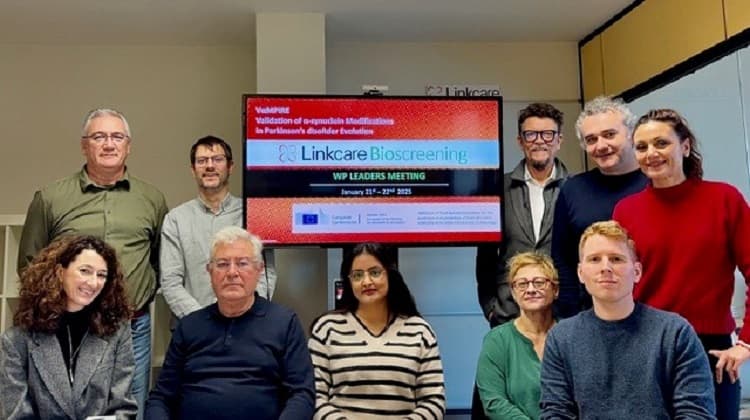
The company, specialized in integrated care services for healthcare professionals, has received a direct grant of 1.8 million euros from the European Commission to promote an innovative solution that could improve early screening for the 270,000 new cases of the disease each year.
- Linkcare receives a €12,000 grant from the Government, through ACCIÓ (Department of Business and Labor), a Collaborative RDI Programs Voucher to hire the services of a consultancy that helped them prepare the European proposal.
- The company was founded in 2010 as a spin-off of the Hospital Clínic for the development of integrated care services, which have been implemented in the Basque health system and several hospitals in China.
The Catalan company Linkcare, a registered European manufacturer of in vitro diagnostic tests, coordinates a European project with a budget of 8 million euros focused on the early detection of Parkinson’s. Specifically, the goal of the consortium, composed of more than a dozen European entities, is to develop and validate an innovative in vitro diagnostic test that allows the detection of the earliest stages of the disease, before symptoms appear.
Linkcare has received support and a €12,000 grant from the Government, through ACCIÓ — the agency for business competitiveness under the Department of Business and Labor — a Collaborative RDI Programs Voucher to hire the services of a consultancy that helped them prepare the European proposal. They have also benefited from other support services through the Enterprise Europe Network (EEN), of which ACCIÓ is a member, to facilitate access to legal review of the consortium agreement with specialized lawyers.
According to Jim Roldan, Chairman of the Board of Linkcare, “Parkinson’s disease presents a complex challenge due to its progressive neurodegenerative nature, which affects multiple body systems.” Roldan points out that “about 270,000 cases are diagnosed worldwide each year,” and therefore, “the imminent availability of new treatments to halt or slow its progression makes early detection a top priority.” He adds, “In the future, early diagnostic tools will be needed to detect it in very early stages, before neurons are destroyed, because once that happens, it is extremely difficult for them to recover.” This is the motivation behind the project they coordinate, called Vampire, for which Linkcare has received a €1.8 million grant from the European Commission, and which will run until 2029.
As a manufacturer of in vitro diagnostic tests, Linkcare has specialized in detecting oncological and neurodegenerative diseases for which early diagnosis can be key to prognosis. The company’s technology is based on detecting biomarkers in extracellular vesicles. “A few years ago, a biochemical communication system was discovered in all living organisms, based on the existence of intracellular vesicles — a kind of bubbles through which Parkinson’s is transmitted,” explains Roldan. According to the researcher, “by analyzing synaptic connections between one neuron and another, we can identify whether a patient is developing the disease before it becomes evident in their clinical presentation and before they start losing motor coordination — the most well-known symptom.”
The screening test developed within the project’s framework consists of an outpatient blood test that examines various biomarkers, as well as extracellular vesicles of neuronal origin called neurosomes. These results are analyzed using a multivariate equation integrated into a generative artificial intelligence model. This model then develops a new equation applied to each sample to obtain a predictive result.
It is worth mentioning that the Catalan participation in this European project also includes the Protein Folding and Conformational Diseases group from the Institute of Biotechnology and Biomedicine and the Department of Biochemistry and Molecular Biology at the Autonomous University of Barcelona, led by researcher Salvador Ventura, with a budget of €340,008.
Linkcare was founded in 2010 as a spin-off of the Hospital Clínic, focused on developing an integrated care model for treating patients both inside and outside hospital settings under a patient-centered collaborative medicine approach (integrated care). For example, the Basque health system (Osakidetza) uses Linkcare’s platform to monitor chronic obstructive pulmonary disease (COPD) across the entire population. Later, they began applying this technology in newly established hospitals in China, where they started deploying five centers in 2019. With the COVID-19 pandemic and the success of virus screening in Andorra, they became a European manufacturer of in vitro diagnostics — a line of work in which they prioritize designing screening tests for early detection of diseases such as Parkinson’s, but also cancer and other neurodegenerative conditions.
